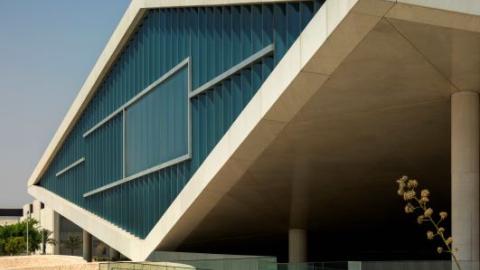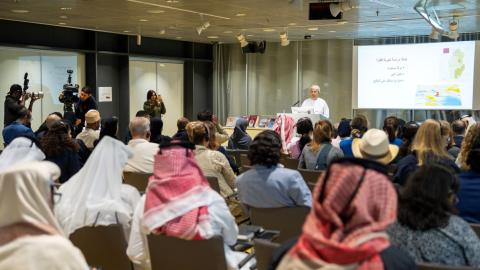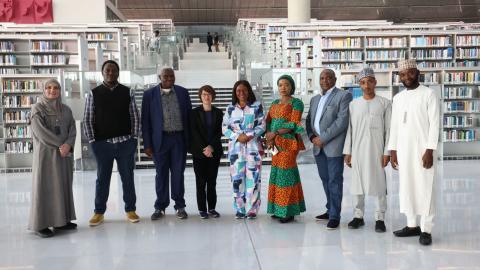
Qatar National Library has marked International Open Access Week 2019 with a series of workshops and events that have led to important dialogues around open and equitable access to Qatar’s research output. Researchers, librarians, research administrators and research funders met in a series of events held from 21 – 27 October that emphasized the Library’s commitment to supporting national innovation and research through open access publishing services and initiatives such as the Open Access Author Fund.
The theme of this year’s Open Access Week, which is marked globally, was “Open for Whom? Equity in Open Knowledge” and focused on the inclusivity of open access and knowledge. Speakers discussed the benefits of open access to Qatar's research ecosystem and the need for initiatives to ensure a system is in place for sharing knowledge within a diverse community.
The open access movement seeks to make peer-reviewed research widely available online, free of cost and with little to no restrictions on copying and reuse. The Library’s Open Access Author Fund helps authors in Qatar pay for submitting articles to open access journals, increasing the reach of the nation’s research. Through these programs, the Library has funded 273 articles since 2017.
Among the presentations organized by the Library was “Citizen Science Workshop” on 20 October. Marcin Werla, Director of Digital Content and Engagement, and Dr. Aurora Castilla, research scientist, introduced the concept of citizen science, which refers to scientific research conducted by amateur scientists amongst the general public. Discussions centered on how open science and data can impact the reach of citizen science.
Elizabeth Varghese, Senior Research Specialist at Weill Cornell Medicine – Qatar, a participant at the event, said: “I use the resources that the Library offers in many ways to enrich my research, and these events make it a lot easier to network as well. The different workshops held to mark International Open Access Week give us researchers a better view of the kind of opportunities that the Library provides and how to use them.”
On 23 October, local researchers and authors gathered for the “Academic Writing and Publishing Workshop” and received valuable guidance from Johanna Kuhn, Institutional Engagement Manager at Springer Nature, on preparing their manuscripts for submission to open access journals and other publications, and also improving the language of submissions to increase the chances of acceptance.
Another participant, researcher Ahmed Salman, said: “The Open Access Week events are very educational and really clarified how the Library can help young researchers as long as we are affiliated with a Qatar institution. The Library’s funding for researchers who wish to publish in open access journals is good news and I will use it in the future.”
The week’s program concluded with “Open Access Week 2019: Open for Whom?” on 27 October, where speakers and participants discussed the benefits of open access to Qatar's research ecosystem, and particularly its vital role in giving visibility to national research outputs and findings. Jon Tennant, Founder of OpenScienceMOOC and PaleoarXiv, shared his thoughts on paths for collaboration with national and international stakeholders to raise the global visibility of research being undertaken in Qatar.
“It is important that libraries, as centers of information, support open access publishing,” said Bilikis Banire, a graduate student at the College of Computer Science and Engineering, Hamad Bin Khalifa University, who attended one of the events. “I use the open access journals and publishing support that the Library provides and I find them very useful. I always consider the Library as a source of information when I do my research and I encourage everyone else to continue to use the resources here.”
The Library is also taking part in various international open access initiatives, such as INTACT’s OpenAPC project, Open Access 2020, and contributes to the development of international open access principles through the International Federation of Library Associations and Institutions.







